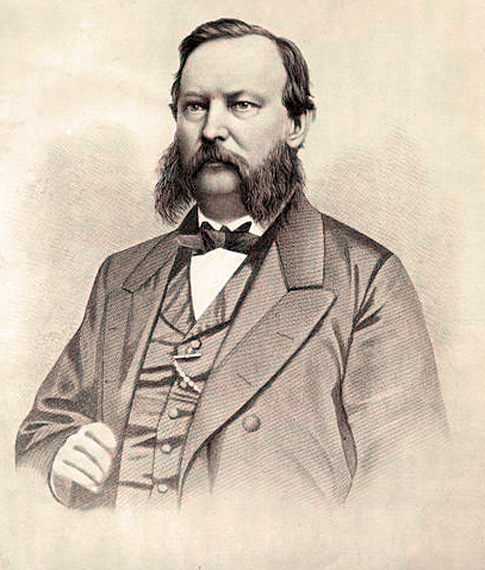Get Today in Masonic History into your Inbox. Sign up today for one of our email lists!
Need an article for your Trestleboard/Newsletter see our Use Policy
Anson Burlingame Passes Away

Today in Masonic History Anson Burlingame passes away in 1870.
Anson Burlingame was an American diplomat.
Burlingame was born on November 14th, 1820 in New Berlin, New York. In 1823, he moved with his family to Ohio and then around the age of 13 they moved to Michigan. From 1838 to 1841 he studied at the Detroit campus of the University of Michigan before transferring to Harvard Law School where he graduated in 1846.
Burlingame opened his law practice in Boston, Massachusetts where he joined the Free Soil Party. In 1848 he gave several notable speeches for the party and began gaining a wide reputation. In 1853 he was a member of the Massachusetts Constitutional Convention. From 1853 to 1854 he was a member of the Massachusetts State Senate. In 1855 he was elected to the United States House of Representatives initially as a Know Nothing and then as a Republican. He served three consecutive terms until 1861.
In 1856 Burlingame became part of one of the bigger events before the American Civil War, the caning of Senator Charles Sumner. Sumner, like Burlingame was anti-slavery. Sumner delivered a scathing speech on the Senate floor where he denounced President Franklin Pierce and other Southerners who sympathized with slavery and encouraged the violence between pro-slavery and anti-slavery individuals in Kansas, known as Bleeding Kansas. Sumner in his speech named Senator Andrew Butler specifically, calling him out for his behavior regarding slavery. Butler's cousin was a member of the Senate as well, Senator Preston Brooks of South Carolina. Three days after Sumner gave his speech, Brooks arrived in the Senate and viciously attacked Sumner. Sumner was beaten by Brooks until unconscious. In his attempt to escape, Sumner ripped his bolted down desk from the floor before losing consciousness.
After the attack, Burlingame gave a speech the New York Times called "the most celebrated speech." It was a scathing denunciation of Brooks and the vicious attack on Sumner. Brooks challenged Burlingame to a duel, which was illegal in the United States. Burlingame immediately accepted the challenge. As the one challenged, Burlingame, who was an excellent marksman, was given the right to choose the location and the weapons. Burlingame chose rifles and the Naval Yard at Niagara Falls, which was in Canada and avoided the ban on dueling in the United States. Brooks failed to show for the duel, it was speculated Brooks was intimidated by the speed and eagerness of Burlingame to accept the duel. Brooks claimed he feared for his life if he had to cross "hostile territory", referring to the northern United States, to reach the duel. Regardless of the duel, Burlingame gained fame throughout the north for his solid defense of a fellow Bostonian.
In 1861, President Abraham Lincoln appointed Burlingame as the Minister to the Austrian Empire. Because of Burlingame's support of Lajos Kossuth, a Hungarian lawyer who was seeking Hungary's independence from the Austrian Empire, Austria prevented Burlingame from serving. Instead, Lincoln appointed Burlingame as the Minister to the Qing Empire of China. Prior to Burlingame becoming Minister China was often on the losing end of any treaty, both from the United States and European countries. Burlingame worked to change long standing policy. This led to Burlingame being named envoy extraordinary and minister plenipotentiary, a diplomat invested with the full power of independent action on behalf of a government. Burlingame returned to the United States in 1867 and began a tour of the country with the Chinese Envoy, advocating for rights for China and for making China the "most favored nation" when it came to Trade with the United States. This led to the Burlingame Treaty which was the first equal treaty with China since the Opium Wars.
Burlingame passed away suddenly on February 23rd, 1870 while in St. Petersburg negotiating a treaty for China. Despite all of Burlingame's efforts, after he passed away most of the countries with equal treaties with China, including the United States, reverted to previous tactics. After the Communist Revolution of 1949 in China, Burlingame's reputation was as a naive and euphoric advocate of China. Burlingame's efforts were actually one of the causes of poor relations between China and the United States, it was not until the 1980's when relations began to thaw and Burlingame's reputation began to rise again.
Burlingame was a member of Amicable Lodge in Cambridge, Massachusetts.
This article provided by Brother Eric C. Steele.

